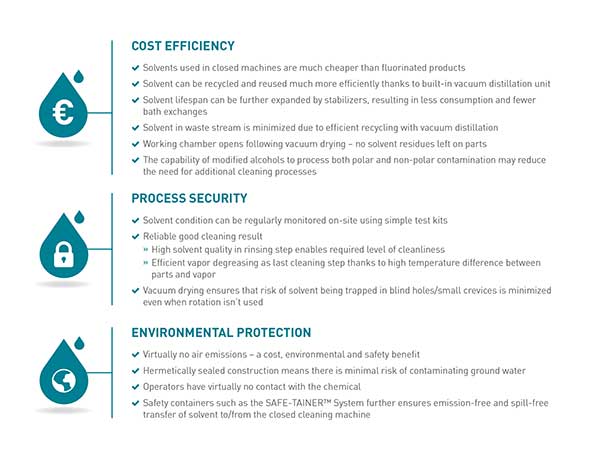With PFAS under regulatory pressure, modified alcohols present a viable alternative to fluorinated solvents for automotive manufacturers.
Düsseldorf – With the increasing regulatory pressure on PFAS which might impact the future use of fluorinated solvents in industrial parts cleaning, many companies are racing to find direct drop-in replacements. SAFECHEM, a chemical service company and solvent risk management expert, offers a long-term perspective – the use of modified alcohols in airtight degreaser as a future-proof cleaning solution – and explains its merit.
Due to acceleratory global regulatory pressure on PFAS (per- and polyfluoroalkyl substances), many hydrofluoroethers (HFEs) and hydrofluoroolefins (HFOs) which fall under the definition of PFAS are now facing an uncertain future. Their use as fluorinated solvents in industrial parts cleaning could be restricted or prohibited.
Many manufacturing companies are currently seeking variations of HFEs and HFOs which are PFAS-free to use as drop-in replacements in open degreaser. It is understandable because direct drop-in replacements can keep the operations running with minimal disruptions.
But there is a much more important and far-reaching question for companies to consider: will drop-in replacements used in open and semi-open (normal atmospheric) equipment also make for a future-proofing cleaning approach – especially when viewed within the context of increasing regulatory requirements on health, safety and environmental protection?
Not to forget that many fluorinated solvents are often blended with Trans-1,2 dichloroethylene (t-DCE) – and t-DCE is under legislative pressure itself.
A viable cleaning solution should not only deliver quality cleaning results, but also enable cost efficiency, safety and sustainability. One such solution is modified alcohol.
Our modified alcohol solvents – DOWCLENE™* 16-Series as well as DUALENE™ 1601 S – are chlorine-free, bromine-free and fluorine-free. Produced synthetically, modified alcohols are remarkably stable in temperature and pH. With both non-polar and polar properties, they can effectively clean off non-polar contaminants such as oils and greases, just as effectively as certain polar contaminations like cooling emulsions or solids such as particles and abrasives.
Modified alcohols have a flashpoint and therefore must be applied in vacuum closed cleaning machines, or the so-called airtight/airless degreasers. Users currently operating open/semi-open equipment are likely to see the initial equipment expenditure as a hurdle. They might also be apprehensive about changing their cleaning process altogether.
However, compared to the high consumption of fluorinated solvents (PFAS-free or not) and their running costs due to emissions and drag out losses, a closed cleaning machine can practically pay itself back due to the many cost savings it enables – in addition to increased process safety and minimized environmental impact.

Cost efficiency
Process security
Environmental protection
Changing your cleaning process from an open to a closed machine can take time and efforts. Technical consultation, testing and verification are particularly vital in the solution finding process.
Users of fluorinated solvents which fall under the PFAS definition are now offered an opportunity to re-assess their current cleaning set-up and exploit alternative options which might bring even greater benefits in terms of cleaning performance, cost savings and sustainability standards in the long run.
Direct replacement can be an option, but it must not be the only one. Companies are well advised to keep an open mind, explore and test until they settle on a technical solution that will not only serve them well today, but also in the years to come.
If you would like to find out whether a modified alcohol based solution could be right for your specific application, please contact Chris Tivnan c.tivnan@safechem.com
For more background information on PFAS and how it might impact use of fluorinated solvents in parts cleaning, please refer to this document: https://insights.safechem.com/pfas_background_flyer
™ Trademark of SAFECHEM
™* Trademark of The Dow Chemical Company
Press Contacts:
Technical information
SAFECHEM Europe GmbH
Tersteegenstr. 25
40474 Düsseldorf
Phone: +49 211 4389-335
Email: m.onken@safechem.com
PR information
Miu Wing Yim-Dahl
SAFECHEM Europe GmbH
Tersteegenstr. 25
40474 Düsseldorf
Phone: +49 211 4389-331
Email: miu.yim-dahl@safechem.com
About SAFECHEM
Established in 1992, SAFECHEM Europe GmbH is an experienced provider of services and solutions for the safe and sustainable use of solvents in metal surface cleaning, textile cleaning, and asphalt analysis.
As a specialist in industrial parts cleaning, SAFECHEM offers a range of high-performing halogenated solvents as well as modified alcohols, along with a comprehensive service portfolio covering test kits and stabilizers, tailored chemical leasing package, waste take-back, lab analysis as well as solvent risk awareness training.
Committed to the principles of Responsible Care® and Product Stewardship, SAFECHEM aims to help companies seize the maximum benefits from solvent cleaning, where risks are properly managed and kept to a minimum, employee welfare and safety is looked after, and sustainability and regulatory compliance are well demonstrated.
With offices in Germany and China, SAFECHEM serves in close cooperation with a network of responsible distributors over 5,000 customers worldwide.
Scott Ellyson, CEO of East West Manufacturing, brings decades of global manufacturing and supply chain leadership to the conversation. In this episode, he shares practical insights on scaling operations, navigating complexity, and building resilient manufacturing networks in an increasingly connected world.